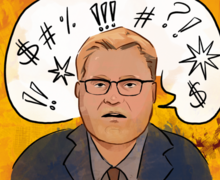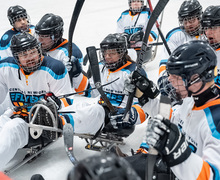Members of SU community face, cope with disaster in Japan
When Yuriko Takahashi woke up Friday morning, she had a voicemail on Skype from her mother. She soon realized her mother had meant to turn off Skype instead of leaving the message. For the next 10 minutes, she was an outside listener on her mother, half a world away in Japan.
First, she heard her mother try to call her father and leave a frantic message asking if he was all right. Next, Takahashi could hear the television, with an announcer saying an earthquake had happened, and then, a tsunami. Finally, she heard her mother start crying and calling out names – Takahashi’s, her brother’s, her father’s.
‘I just woke up and opened my laptop, and I didn’t know what happened in Japan,’ Takahashi said.
After three hours of trying to contact family members, Takahashi finally reached her family. Everyone was fine, and her mother did not even realize she had left the message. Takahashi’s family lives in the town of Saitama, Japan, which is high enough that it was not hit by the tsunami.
Takahashi, a second-year doctorate student in chemistry, is one of 58 international students from Japan at Syracuse University. That number does not account for the number of students, faculty and alumni with friends and family living in Japan, or SU students studying there affected by the disaster.
In the wake of the 8.9-magnitude earthquake and subsequent tsunami that hit Japan on Friday, members of the SU community are reaching out to friends and family, and coping with the devastation. The earthquake is the fourth-largest worldwide and Japan’s largest in history.
Jeffrey Matthews, an international student from Hong Kong, has still not been able to reach his grandparents, who live in Tokyo. But he knows they are OK because his sister spoke with them immediately following the first shock.
‘Immediately after it stopped she called my grandparents,’ said Matthews, a senior economics and political science major. ‘My grandmother found shelter – usually they hide under doorframes. After, she went outside to look for my grandfather, and he was holding onto a telephone pole.’
Matthews said he felt behind on his response, as he didn’t hear about the earthquake and tsunami until he woke up Friday morning about nine hours after it happened. By that time, phone service was down in Tokyo.
This is the second natural disaster in the Pacific to affect Matthews and his family. When a tsunami hit Thailand in 2004, a home owned by his father was completely wiped out. The family had been scheduled to visit the next day.
‘It was kind of like ‘Oh my god, not again,” Matthews said about hearing of Friday’s disaster. ‘But this time it was a little more immediate. It took me a while to get a hold of my parents as well; it was just difficult to know if my grandparents were OK.’
Matthews also has an uncle who lives in Japan. After the earthquake, the trains in Tokyo shut down, and roads were temporarily the only means of transportation. Matthews’ uncle walked a 4-hour trek to his parents’, Matthews’ grandparents, home to see if they were OK.
Even though he knows they are safe, Matthews is still trying to reach his family members.
Shoko Kato, a doctorate student in entrepreneurship and emerging enterprises, said it’s hard to do anything but worry and check the news during this time. She first heard about the earthquake on NPR when she woke up Friday morning. As she began to check the news, she realized her brother lives near Fukushima, Japan, one of the most affected areas.
After two hours of calling, she eventually reached her mother, who said her brother was safe. It wasn’t until Saturday that Kato heard from her brother via e-mail.
‘You don’t want to think,’ Kato said. ‘It’s just sending e-mails, and just keep calling, look at the news – otherwise you just don’t think because you don’t want to think.’
Far away from Syracuse, SU alumni and students are also dealing with and witnessing the devastation in Japan.
Rika McKenna, an SU alumna and former adviser at the Lillian and Emanuel Slutzker Center for International Services, was in her office in Zama, Japan, when the ground began to shake, she said, in an e-mail. Within 30 minutes, her office was evacuated three times, for the earthquake and two aftershocks.
The trains had stopped, making travel difficult. When McKenna left work after the third evacuation, she and her 6-year-old daughter had to walk 40 minutes for the trip that would normally take a few minutes by train. Her husband went to school to check on their 9-year-old son, she said.
McKenna and her family live about 250 miles from the hardest hit area, she said, and there was no damage to their apartment. The family felt aftershocks for the rest of Friday night a few times every hour, she said.
‘We are keeping TV off since our daughter would be scared,’ McKenna said.
SU alumnus Chico Harlan is reporting in Japan for The Washington Post. His job is to coordinate coverage between the different reporters around Japan, as the communication is rough in the hardest-hit parts of the country, he said in an e-mail. It wasn’t until two days after the quake that he received reports from a fellow reporter in Fukushima.
Harlan was on vacation in Hiroshima with five visiting friends when the earthquake hit. The group was about to board a bullet train to Kyoto when Harlan heard about the earthquake. His vacation ended there. He wrote until 1 a.m. Saturday morning, slept for four hours, and continued writing and reporting.
‘It was sort of heartbreaking, ending this vacation right there on the train tracks,’ Harlan said. ‘But I had a sense even in those first few minutes that this was going to be a gigantic story that I had to live, so to speak.’
Published on March 12, 2011 at 12:00 pm





